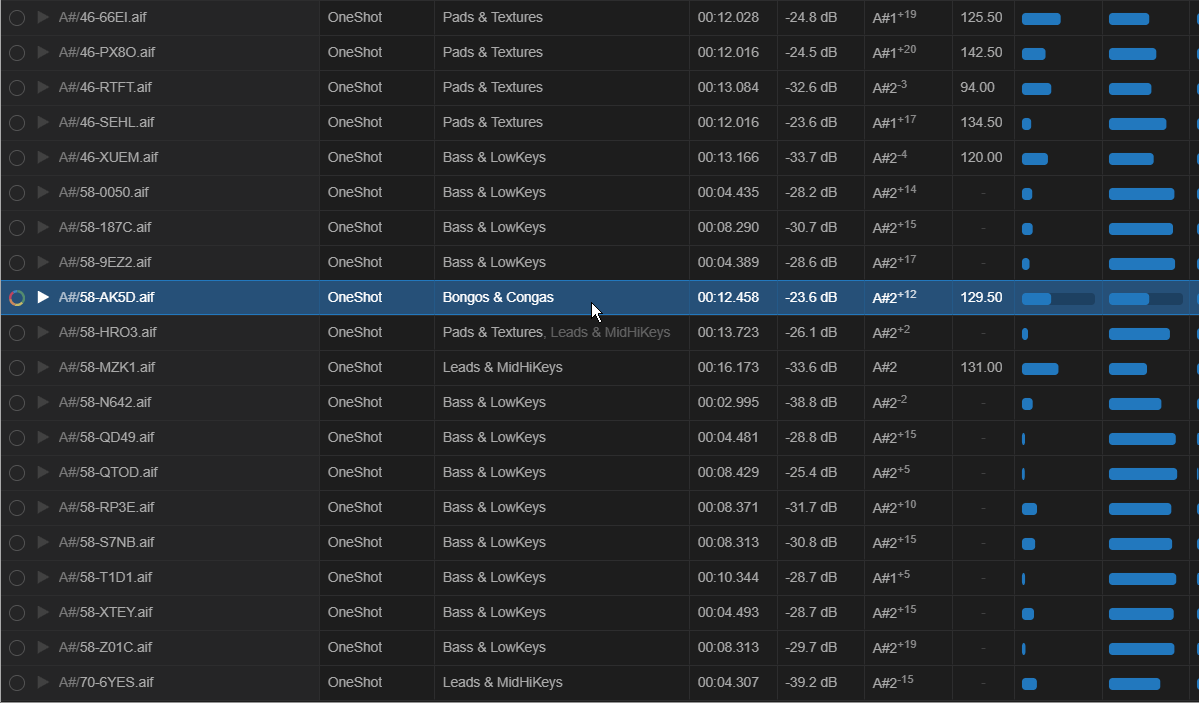Classes & Categories
When a sound is added to a Sononym library, it will automatically be classified & categorized according to our machine-learning model.
NB: This page explains how those categories and classes work. To learn how to sort and filter search results by category, please visit the category filter page.
Classes
A sample can be classified in four different ways:
- LOOP
- ONESHOT
- LOOP + ONESHOT (primarily a loop)
- ONESHOT + LOOP (primarily a oneshot)
A sound is classified as a LOOP when it seems to have a looping or repetitive nature. Sononym does not (yet) assign categories to Loops.
A sound is classified as a ONESHOT when the sound is non-repetitive. Oneshots are almost always categorized.
Categories
When processing a sample, the software will determine how much it matches the built-in categories. There are dozens of categories, divided into three groups: Tonal, Percussive and Sound Effects (XFX).
Percussive Sounds
This category covers sounds with a mostly ‘percussive’ quality. That is, mostly (or completely) atonal sounds with a clear impact, leading into a sustained decay.
- Bongos & Congas
- Claps
- Cymbal Crashes
- Cymbal Rides
- Hats & Shakers
- Kicks
- Metal Hits
- Snares
- Snips & Snaps
- Toms
- Vibraslap & Guiro
- Vinyl Scratches
- Wood Hits
- Zaps & Blips
Tonal Sounds
This category includes sounds with a primarily ’tonal’ character. The sounds can be both simple or complex, sustained or decaying.
- Bass & LowKeys
- Blips & HighKeys
- Leads & MidHiKeys
- Pads & Textures
- Stabs & Orch. Hits
- Triangles & Bells
- Voice & Acapella
Sound Effects (XFX)
This category covers sound effects of various kinds.
- Breaks & Smashes
- Cracks & Rustle
- Explosions & Shots
- Nature & Athmospheric
- Noise & Distortion
- Sweeps & Lasers
- Whooshes & Whips
Manually override classes & categories
While the classification system in Sononym can recognize sounds from a wide variety of sources, it certainly isn’t perfect. Therefore, it’s possible to override predictions from the neural network. It’s dead simple - see the animation below:

‘Fixing’ a sample that got misclassified
When you override the value, your choice also affects how similarity search is working. A manually assigned class/category will receive a “perfect” score, and as a result of this, will appear topmost in the search results when you browse by category.
Note that you can only use the pre-defined categories. We will introduce custom tagging at a later point, which will allow you to organize things exactly as you want.